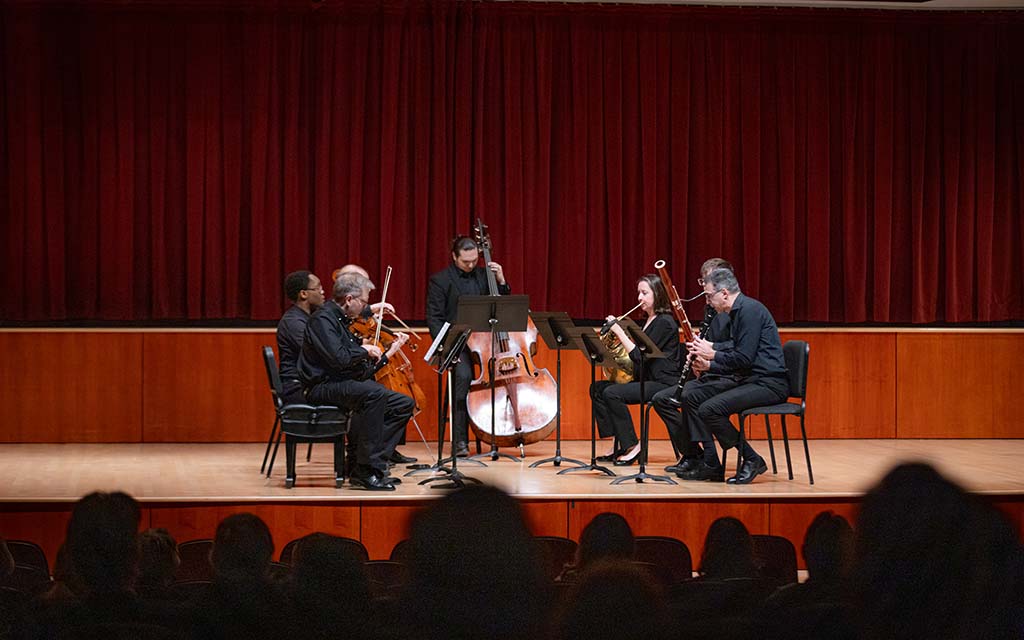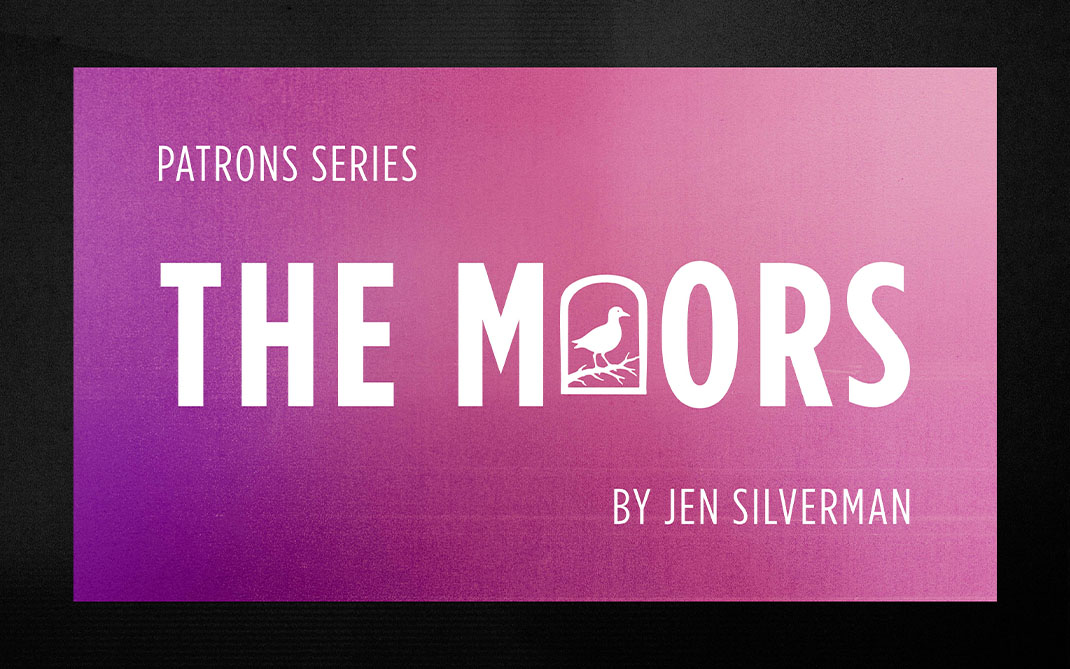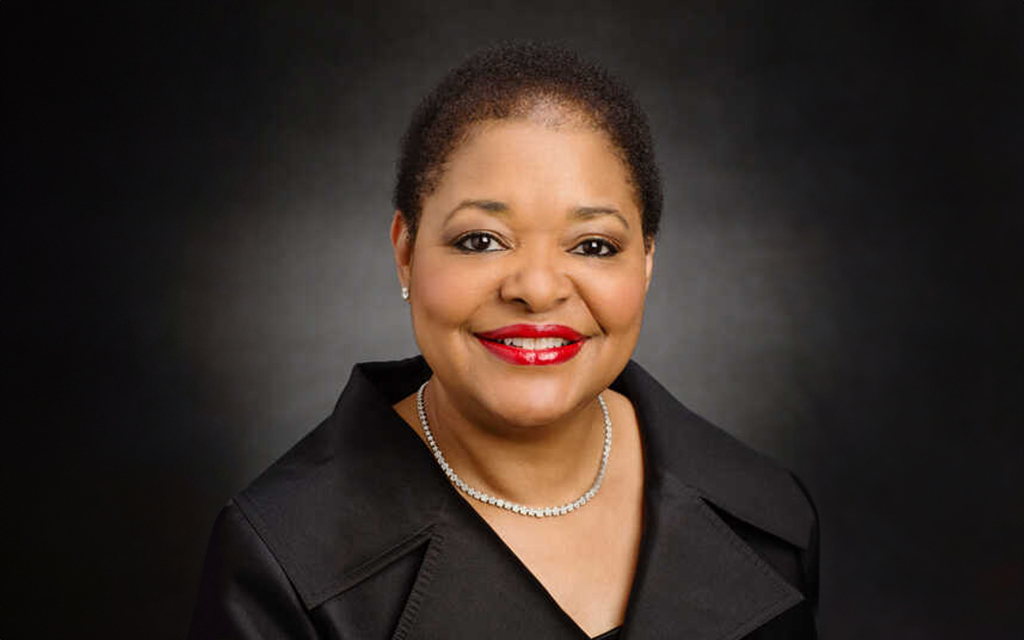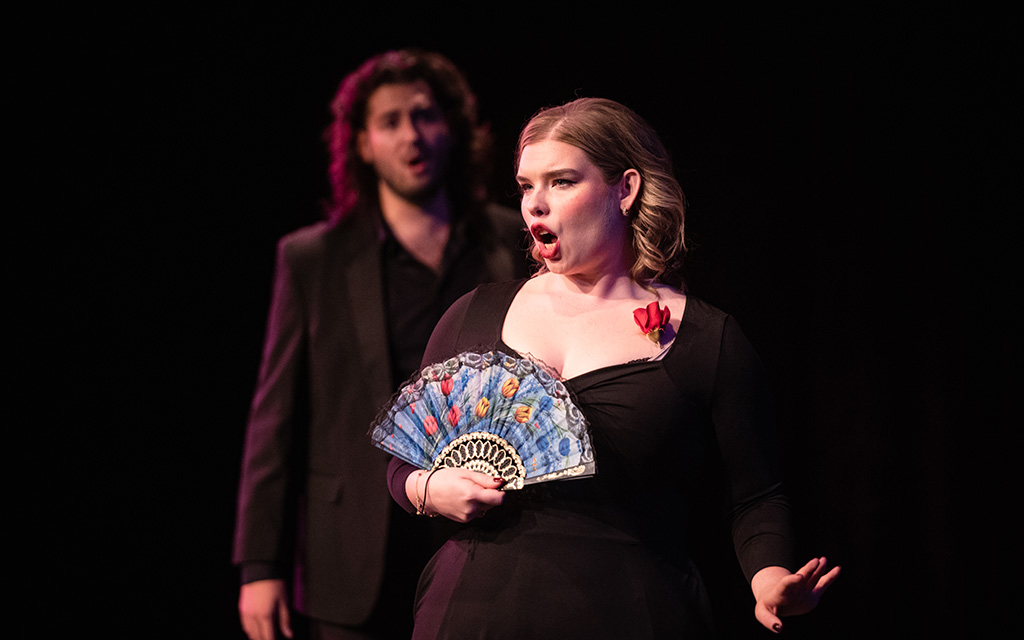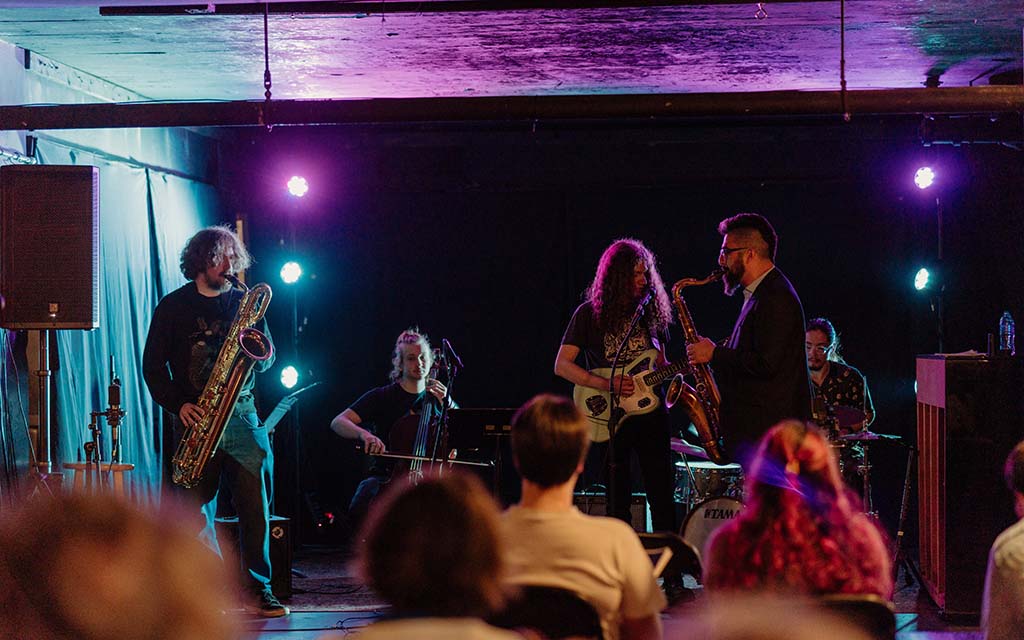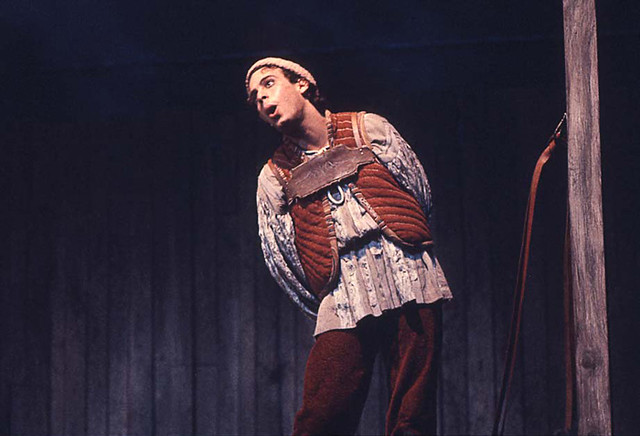Significance on stage and screen: Joe Mantello reflects on a multi-hyphenate career
Two-time Tony Award-winner Joe Mantello (B.F.A. Drama '84) is a highly lauded director of stage and screen and an in-demand actor. His career — spanning nearly four decades following his UNCSA graduation — ranges from the acclaimed “Angels in America,” “Wicked,” and “Three Tall Women” on Broadway to recent popular television series “American Horror Story” and “Feud.”
He is an American Theater Hall of Fame inductee; an Emmy Award nominee; and the recipient of multiple Drama Desk, Outer Critics Circle and Drama League Awards. He most recently directed the premiere of Stephen Sondheim’s final musical, “Here We Are,” which the New York Times deemed “cool and impossibly chic.” On paper, he has earned bragging rights.
In person, he is humble, having achieved perspective and a great deal of wisdom among the accolades. How does it feel to be at this place in his career? Mantello gives a soft, pensive smile. “I consider myself to be incredibly fortunate. I’ve been able to do everything I dreamed of doing and certainly everything that I never could have imagined,” he says. “I’m in the bonus round and everything that is still to come will be a surprise.”

Joe Mantello / Photo credit: Dave Krysl
An inspired start
Mantello’s dreams of a career in theater began in high school, in his hometown of Rockford, Illinois. Late during his junior year, a catalog advertising what was then North Carolina School of the Arts caught his eye. He auditioned for the School of Drama and awaited a response. “All my eggs were in one basket,” he remembers.
Stepping onto campus for the first time to begin his studies, Mantello found an intimate environment where he was familiar with every student, regardless of their program of study. “It was a transitional place to be for sure,” he says. “The theater community I came from was small and intimate, so NCSA was a nice way to segue into more professional training.” Right away, Mantello knew he had found his place. “Just the general idea that I could spend an entire day thinking about nothing but making theater was incredible… I thought I had died and gone to heaven,” he recalls.
Though many of Mantello’s most notable career moments center around his directorial work, the School of Drama didn’t offer a concentration in directing at the time. But student collaboration outside the classroom was encouraged, as it is now. “[Directing] was sort of a late-in-the-game discovery for me at NCSA, really at the eleventh hour,” says Mantello. Inspired by his classmate Peter Hedges’ student-generated work, Mantello decided to try his hand at directing during the final weeks of his senior year. “We pulled four actors together and did four monologues in a tiny black box theater,” he recalls. A flame was lit — a flame he recognizes in students today.
He has returned to campus occasionally over the years and though the surroundings have changed, much feels the same. “In some ways, I recognize those students,” Mantello says, “their desire and their passion, their searching and their curiosity… it’s all still the same. I recognize and see myself there. I see the ghost of time, but I also see the continuum of what happens in that very special place.”
Gird your loins
After graduation, Mantello moved to New York City with an interest in both acting and directing. “It’s a shock to the system to leave NCSA and come somewhere like New York. You really have to earn your place there,” says Mantello. “The first few years are really about New York trying to spit you out, and you have to gird your loins and stand your ground. The whiplash can be jarring.”
Mantello lived in the city with two former classmates, working to make ends meet while continuing to create art. He co-founded The Edge Theater with his fellow alumni, which went on to produce several of Hedges’ plays. When later given the opportunity to audition for the Circle Rep LAB, the developmental extension of the now-defunct Circle Repertory Company, Mantello chose a scene from one of Hedges’ plays to read. He scored a company role. “Once I had a home with the LAB, it really changed everything for me,” he says. “I was still out there trying to make a living and scrambling to pay my rent, but also, every week, I could be around a community of like-minded people who got together and just had a place to throw ideas around. And that really saved me, I think, in the end.”
Over the next several years, Mantello acted in and directed a variety of off-Broadway productions for Circle Rep. When reminiscing on those early years, Mantello describes a haphazard series of events that led him to a break in his career: “You can’t draw a straight line,” he explains. “I met this person, I got into the LAB, I did this and then I met this person who was there… I did a main stage show at Circle Rep. Tony Kushner [the “Angels in America” playwright] was there. I got an audition for “Angels in America.”
Changed for good
Mantello made his Broadway acting debut as Louis Ironson in “Angels in America: Millennium Approaches,” the first installment of the two-part “Angels in America” play. In 1993, he received his first Tony Award nomination for best featured actor in a play. A year later, Mantello directed “Love! Valour! Compassion!” — which found a home in Broadway’s Walter Kerr Theatre following a sold-out off-Broadway run. In 1995, he received a second Tony nomination, this time for best direction of a play. Now, opportunities to helm new Broadway and Off-Broadway productions and revivals rolled in more quickly as Mantello shifted his focus entirely to directing for the next decade.
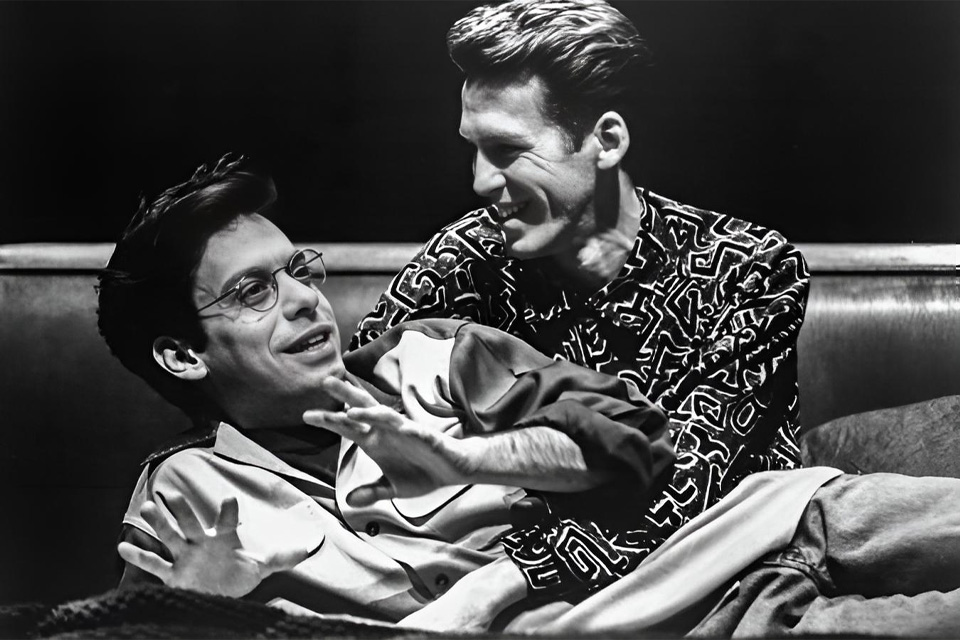
Joe Mantello in “Angels in America” / Photo credit: Playbill
In 2002, Mantello directed the London premiere of Richard Greenberg’s “Take Me Out” and, later that year, the show premiered to American audiences at The Public Theater. In February 2003, “Take Me Out” transferred to Broadway, to the same theater where Mantello had directed “Love! Valour! Compassion!” eight years before and had taken the stage in “Angels in America” a decade prior. At the 2003 Tony Awards, Mantello took home his first award: best direction of a play for “Take Me Out.” His career was now a whirling tornado.
And the tornado landed in Oz. On October 8, 2003, “Wicked” premiered at Broadway’s Gershwin Theatre with Mantello as director. The powerhouse musical is now considered a Broadway classic and holds the place as the fourth longest-running show on Broadway behind “The Phantom of the Opera,” “Chicago” and “The Lion King.” “Wicked” has also delighted audiences worldwide with a considerable number of national and international tours. The production recently celebrated its 20th anniversary and has held nearly 8,000 Broadway performances — Mantello’s name in the playbill to this day.
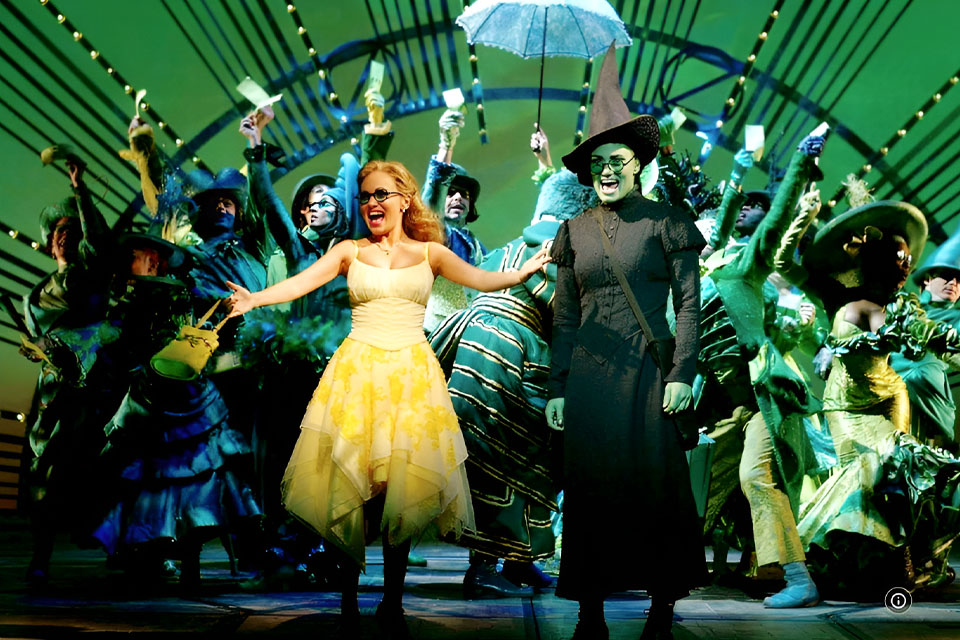
The 2003 production of "Wicked" directed by Joe Mantello / Photo credit: IMDB
Though he’s hesitant to say that “Wicked” was the moment he felt he had ‘made it’ (he’s hesitant to name a singular moment at all), Mantello acknowledges the advantages that have come as a result of being associated with the successful show.“When you have a long-running show like ‘Wicked,’ it allows you to make choices based on what you’re passionate about. Once that came along, it allowed me to make decisions in my life and in my career that were just based on the things I wanted to do and not things that I had to do.”
The decision making is surprisingly easy for Mantello at this stage in his career. “The work chooses me,” he says. “There was a period in my life when I chose projects because I thought I should, or because they were high profile or because they were working with a particular celebrity.” Sometimes, the plays didn’t resonate with Mantello but aligned in other ways. Sometimes, he passed on productions that went on to become incredibly successful. “So it’s not about the quality of the piece, but about my instinctual connection to it where I feel like, ‘yes, I’m the right person to do this.’ I have to have that click go off for me.”
In 2016, Mantello was invited to an early reading of what would become “Here We Are” — a musical written by David Ives, with music and lyrics by Stephen Sondheim. “I had the opportunity to experience the material in a different way than just reading it,” says Mantello. “And even though they were still developing it, I felt a connection and wanted to jump on board and join the team.” Click.
Mantello had previously collaborated with Sondheim on “Assassins,” for which he took home a Tony Award for best direction of a musical. “‘Here We Are’ is wildly theatrical. It’s incredibly challenging material,” Mantello says, explaining his immediate connection to the musical. “Sometimes I take things on because I want to learn something or because I want to get better. Sometimes I don’t know that I can do it… that the challenge is so enormous I’m drawn to it because I want to challenge myself.”
Fulfilling work
For Mantello, and for many artists, it’s more rewarding to consider moments of overcoming challenges or moments of fulfillment rather than moments of success. An event in 1984 made an incredible impact on Mantello, leading him to his most meaningful work years later. “There was a seismic shift in me and my perspective on how to make theater — and that was when I first saw work from Steppenwolf,” recalls Mantello. Chicago-based Steppenwolf Theatre Company co-produced an off-Broadway run of “Balm in Gilead” with Circle Rep, which Mantello attended soon after moving to New York. Here, Mantello saw Laurie Metcalf perform for the first time.
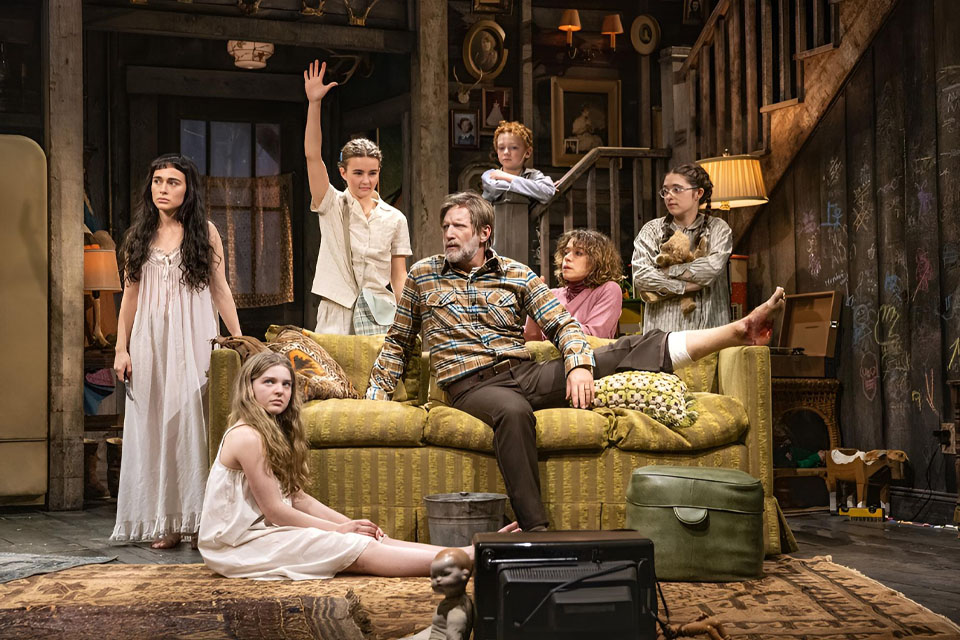
The production of "Grey House" directed by Joe Mantello / Photo credit: Matthew Murphy, UNCSA Dance alumnus
“She was, and still is, perhaps the greatest actor I’ve ever seen on stage,” he says earnestly. “I was drawn to the way in which she existed on stage. And so it sort of became on my bucket list to work with her.” He had the opportunity more than two decades later when she joined the cast of “November,” a David Mamet play directed by Mantello in 2008. “Since then, I think we’ve done seven or eight things together,” says Mantello. “The collaboration with Laurie remains the highlight of my experience as a director, to find someone who is so like-minded. We make things in the same way and have the same sense of humor. I’m fortunate to have that kind of creative, ongoing partnership with someone.”
Editor’s note: Mantello directed Metcalf in “Grey House” on Broadway in 2023 and they’ll collaborate again on an upcoming project for Steppenwolf.
Embracing old and new
Mantello has also embraced a creative partnership with television and film producer and director Ryan Murphy. In 2010, Mantello returned to his acting roots, starring as Ned Weeks in the Broadway premiere of “The Normal Heart.” Four years later, he reprised the role for a film adaptation that was directed by Murphy. They’ve since worked closely on several of Murphy’s projects, including “The Boys in the Band” (Mantello directed both on Broadway and for film), “Hollywood,” “The Watcher,” “American Horror Story: NYC,” and “Feud: Capote Vs. The Swans” (set to premiere on FX on January 31).
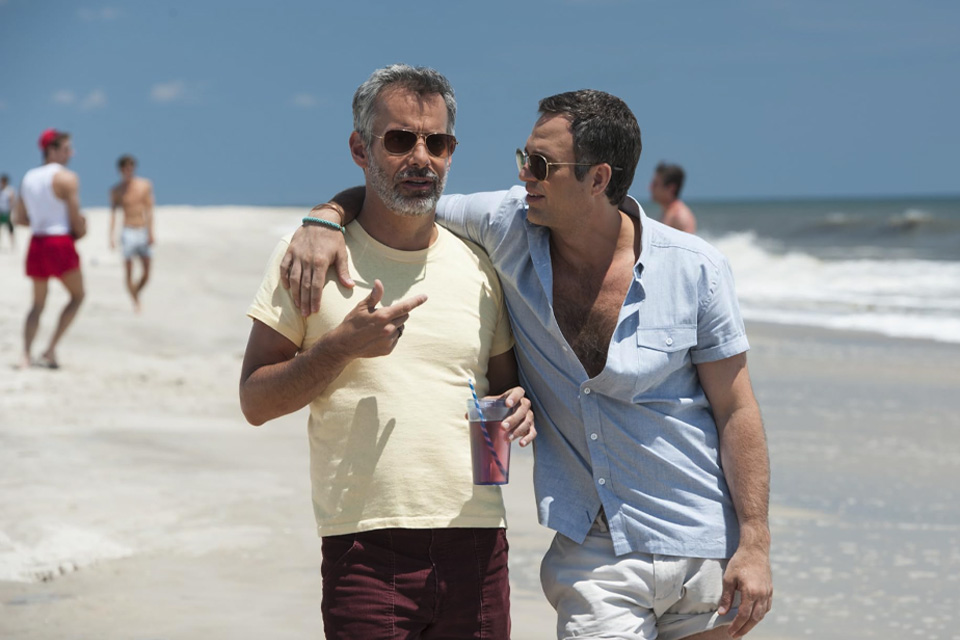
Joe Mantello with Mark Ruffalo in “The Normal Heart" / Photo credit: IMDB
“He offered me the part of Jack Dunphy, who was Truman Capote’s partner for 35 years,” says Mantello of his upcoming stint on “Feud.” “And if I’m being quite honest, it’s not a part that anyone would think of me playing.” Mantello initially turned him down, citing other actors he felt were better choices. But, as usual, Murphy made the right selection. “He really pushed me to take it on,” says Mantello, “and I felt like I was wearing an ill-fitting suit for the first couple of episodes. It didn’t feel right. But eventually, I found my way through it, and he pushed me to go outside of my comfort zone.”
Mantello likens his relationship with Murphy to his early experience at the LAB and Circle Rep: “They were committed to me, regardless of the outcome of the project. They were committed to me as an artist who is still growing and learning and making mistakes, having triumphs and failures. That’s how you get better. And it has been the same experience with Ryan. I didn’t act for many, many years and he has given me numerous opportunities later in life to learn how to work in film and television.”
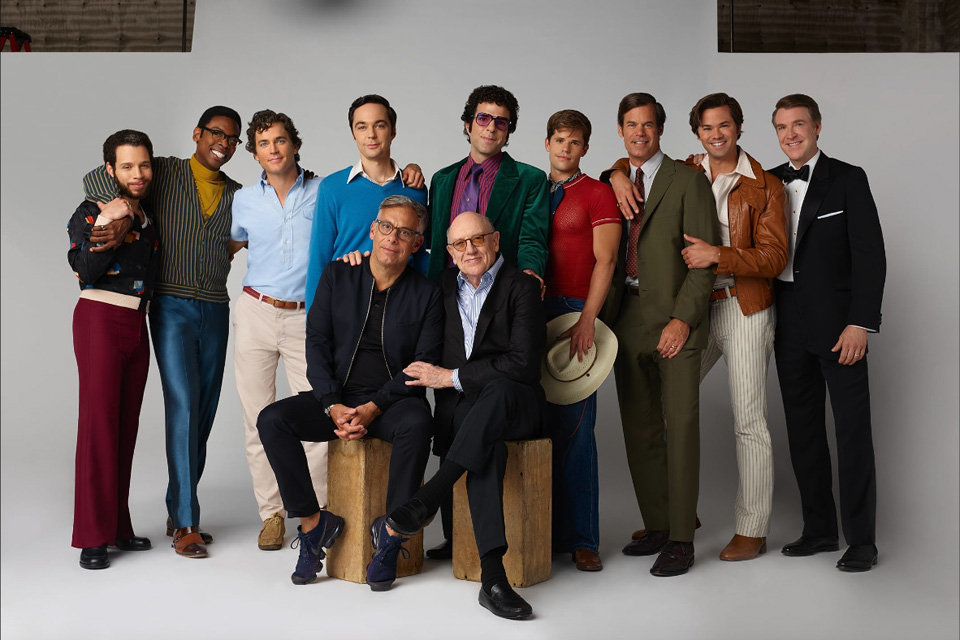
Joe Mantello with “The Boys in the Band” cast / Photo credit: IMDB
He recalls the collaboration with Murphy on “The Boys in the Band” as a moment that Murphy’s vision gave him the opportunity to bolster his own skills and ambitions. “When he came to me with that show, he said we’d do it on Broadway, then on film. And I just never thought that would come to pass. I had made a movie maybe 20 years earlier, but I’m not a filmmaker. Ryan’s belief in you gives you the confidence to put yourself out there.”
Follow your passion
Mantello’s recent acting work may be surprising to those who know him only by his theater credentials, but it underscores two key mantras he follows: follow your passion and leave yourself open to surprise.
“The trajectory of your career is not going to go the way you imagine it. It cannot be laid out in a logical and straightforward way. The path is circuitous,” says Mantello. “Commit to things you believe in, commit to what you’re passionate about and work with like-minded people. You’ll be surprised where it takes you.”
Get the best news, performance and alumni stories from UNCSA.
SUBSCRIBE TO OUR NEWSLETTERS(OPENS IN NEW TAB)(OPENS IN NEW TAB)(OPENS IN NEW TAB)(OPENS IN NEW TAB)(OPENS IN NEW TAB)(OPENS IN NEW TAB)(OPENS IN NEW TAB)(OPENS IN NEW TAB)(OPENS IN NEW TAB)(OPENS IN NEW TAB)(OPENS IN NEW TAB)
January 11, 2024
